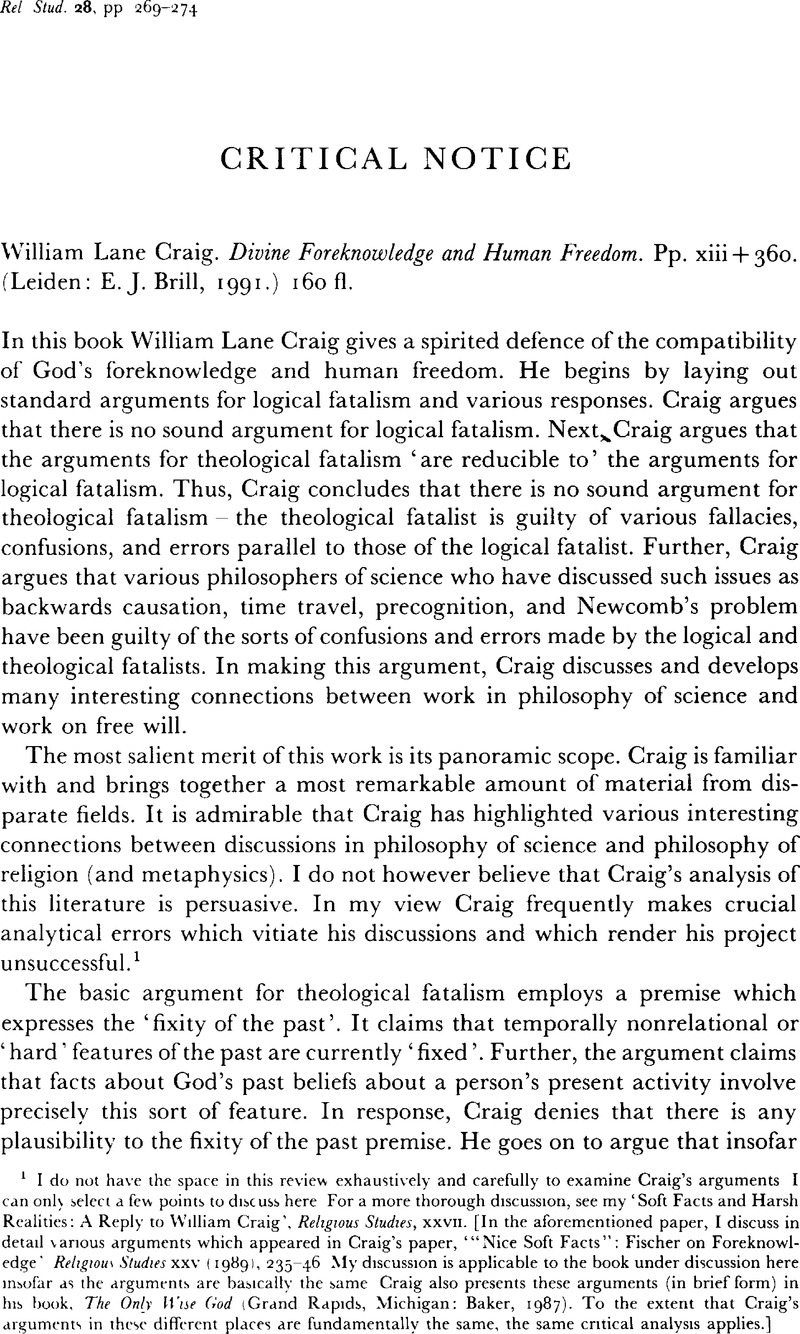No CrossRef data available.

I do not have the space in this review exhaustively and carefully to examine Craig's arguments I can onh select a feu points to discuss here For a more thorough discussion, see my ‘Soft Facts and Harsh Realities: A Reply to William Craig’, Religious Studies, xxv [In the aforementioned paper, I discuss in detail various arguments which appeared in Craig's paper, ‘“Nice Soft Facts”: Fischer on Foreknowledge’. Religious Studies xxv (1989), 235–46.Google Scholar My discussion is applicable to the book under discussion here insofar as the arguments are basically the same. Craig also presents these arguments (in brief form) in his book, The Only Wise God (Grand Rapids, Michigan: Baker, 1987). To the extent that Craig's arguments in these different places are fundamentally the same, the same critical analysis applies.]Google Scholar
2 Later in his book, Craig points out that God can be taken to be the Predictor in Newcomb's Problem. On such a view, God is simply assumed to have foreknowledge of an individual's choice, although the individual is by hypothesis taken to be free not to make the choice in question. But this supposition would appear to be egregiously question-begging, within the context of an assessment of theological fatalism. So Craig is committed to a most bizarre pattern of judgments about the problematic of the debates about theological fatalism: it is question-begging to apply an (allegedly) independently motivated fixity of the past constraint, but it is not question-begging to assume in Newcomb's Problem that God is the Predictor and thus that God has foreknowledge of a free choice. Evidently, Craig's standards for begging the question are rather variable and selective!
3 In the context of a discussion of an argument (presented by Carl Ginet) for the incompatibility of rausal determinism and human freedom, D. Goldstick makes precisely the same move as does Craig, and it can be seen to be problematic in a similar way. (Goldstick, D., ‘Why We Might Still Have A Choice’, Australasian Journal of Philosophy, LVII 1979;, 305–8. Goldstick asks us to imagine a case in which some deed D issues from condition C (which obtained prior to the relevant individual's birth) via the mediation of a predominant wish II' to perform D;. Goldstick points out that it may be true that (1) If W hadn't occurred, then D wouldn't have occurred. And he concludes that the individual has a choice about the occurrence of D; the critical assumption here is that (1) is sufficient for the claim that the individual has a choice about the occurrence of D. But suppose now that an individual actually performs a deed D as a result of a predominant wish W to perform D. But the wish here was induced by a demonic scientist who directly controls the individual's brain process (through a sophisticated computer of some sort). Indeed, the scientist controls all of the individual's behaviour through direct manipulation of the brain; this control is based upon the scientist's desires and projects land not the individual's), and the scientist's instruments are completely foolproof. Now the scientist's actually exerting this sort of control is consistent with its being the case that if W hadn't occurred, the scientist wouldn't have exerted control. Perhaps if W hadn't occurred, a desire W' for E would have occurred and E would have ensued. But the truth of this conditional does not alter the fact that the scientist actually controlled the individual's behaviour and that the individual has no power to do otherwise. Thus, it can be seen that (1) is not sufficient for the pertinent can-claim, namely the claim that the individual has a choice about the occurrence of D. Goldstick's error is parallel to Craig's, and they can be exposed in parallel ways.CrossRefGoogle Scholar
4 Craig, 143.
5 By ‘hard’ here I mean to include soft facts with hard aspects or parts, i.e. hard-type soft facts.